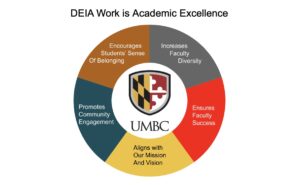According to the UMBC Faculty Handbook:
“Each department shall create and periodically review guidelines for promotion and tenure that reflect UMBC’s values, mission, and vision, as appropriate to the department’s discipline/fields. The department policies should include consideration of community engagement, interdisciplinarity, technology transfer, inclusive excellence, and advancing knowledge. Policies should include criteria for promotion for faculty ranks to Associate Professor, Professor, Senior Lecturer, and Principal Lecturer.
Each department shall specify in writing which members of the department have the authority to establish and revise the Departmental Guidelines. Each department shall also specify in writing the procedures for the periodic review and revision of the policy.
If applicable to the candidate, the self-assessment should also discuss achievements in promoting diversity, equity, inclusion, or accessibility in the areas of scholarship, teaching, and service” (6.4.1 “Department Guidelines for Promotion and Tenure”)
Ideally, these guidelines should be the result of ongoing intensive, honest and open conversations within each department about what inclusive excellence means for their department, the university and for their discipline.
In order to facilitate these conversations, departments may consider the following:
- Forming a departmental DEIA committee.
- Conducting a department-wide survey to assess diversity, sense of belonging, perceived efforts around inclusivity, challenges, and opportunities.
- Crafting a diversity statement for your departmental website. There are many examples listed under the College and Discipline-Specific tab on the lefthand side of this page.
- Initiating a department book club on DEIA in your discipline or in the academy. Check out our list of books and articles in Additional Readings.
- Holding a DEIA departmental retreat.
- Devoting some time at every department meeting to discuss issues of DEIA.
- Requesting a moderator/facilitator for departmental meetings, guided small group discussions or listening sessions. Orianne Smith (osmith@umbc.edu) and Carole McCann (mccann@umbc.edu) would be pleased to provide this support for any department that requests it.
The College and Discipline-Specific links provide additional examples of diversity statements, action plans and articles that departments may find useful.

Resources:
Eight Levers to Shift Climate for Respect and Inclusion
Project Implicit. An implicit bias test to test your own biases that was created by an international collaborative of researchers who are interested in implicit social cognition.
[Graphic inspired by Dr. Mary Lomax-Ghirarduzzi’s provocation at the 2022 Georgetown Summer Equity Institute, “How Do We Institutionalize Love? A Humanizing Framework for Belonging and Justice in American Higher Education.” Used with the author’s permission.]